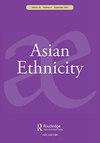The political legacies of transmigration and the dynamics of ethnic politics: a case study from Lampung, Indonesia
IF 0.8
Q3 ETHNIC STUDIES
引用次数: 5
Abstract
ABSTRACT This paper discusses the political legacies of transmigration in local elections in Indonesia. Lampung province has an unusual ethnic make-up because in the past 100 years both the Dutch colonial administration and Indonesian Government have been implementing a transmigration programme. Transmigration has therefore changed the demographic pattern of Lampung. Since 2005, the mode of local election has been changed from indirect to direct. As a consequence of this, there is a revival of ethnic identity politics in local elections. In this paper, we focus on a transmigration affected area where the descendants of Javanese transmigrants are numerically dominant and correspondingly powerful in local politics. This research leads us to argue that ethnicity has become an important factor in local elections and that in transmigration affected areas it has led to the political domination of Javanese transmigrant descendants in local politics. We further to show how, in response to this, native Lampungese elites have adopted a number of strategies to help them retain a role in local politics. Our argument runs contrary to that of some scholars who have claimed that ethnicity is playing a diminishing role in Indonesian local elections.移民的政治遗产与族群政治的动态:以印尼楠榜为例
本文讨论了印尼地方选举中移民的政治遗产。楠榜省具有不同寻常的种族构成,因为在过去100年中,荷兰殖民政府和印度尼西亚政府一直在执行一项移民方案。因此,人口迁移改变了楠榜的人口结构。2005年起,地方选举方式由间接选举改为直接选举。因此,在地方选举中出现了民族身份政治的复兴。在本文中,我们关注的是一个受移民影响的地区,在那里爪哇移民的后代在数量上占主导地位,相应地在当地政治中具有强大的影响力。这项研究使我们认为,种族已经成为地方选举的一个重要因素,在受移民影响的地区,它导致爪哇移民后裔在当地政治中占据政治主导地位。我们将进一步展示,作为对这种情况的回应,南榜西的本土精英们是如何采取一系列策略来帮助他们在当地政治中保持自己的角色的。我们的论点与一些学者的观点相反,他们声称种族在印度尼西亚地方选举中的作用正在减弱。
本文章由计算机程序翻译,如有差异,请以英文原文为准。
求助全文
约1分钟内获得全文
求助全文
来源期刊

Asian Ethnicity
PHYSIOLOGY-
CiteScore
2.80
自引率
6.20%
发文量
27
期刊介绍:
In the twenty-first century ethnic issues have assumed importance in many parts of the world. Until recently, questions of Asian ethnicity and identity have been treated in a balkanized fashion, with anthropologists, economists, historians, political scientists, sociologists and others publishing their studies in single-discipline journals. Asian Ethnicity provides a cross-disciplinary, international venue for the publication of well-researched articles about ethnic groups and ethnic relations in the half of the world where questions of ethnicity now loom largest. Asian Ethnicity covers any time period, although the greatest focus is expected to be on the twentieth and twenty-first centuries.
 求助内容:
求助内容: 应助结果提醒方式:
应助结果提醒方式:


